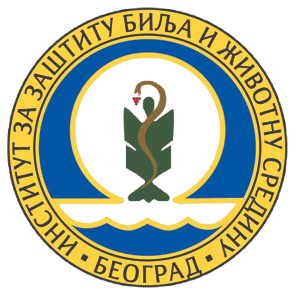
Dr Tatjana Cvrković
Principal Research Fellow
Department of Plant Pests
Laboratory for molecular diagnostics and Laboratory for applied entomology
e-mail: tanjacvrkovic@yahoo.com, tatjana.cvrkovic@izbis.bg.ac.rs
mob. +381 62 8808 925
http://orcid.org/0000-0001-5108-2323
https://scholar.google.com/citations
Research field
Biology, ecology and population genetics of planthoppers and leafhoppers (Hemiptera, Auchenorrhyncha) and their role in transmission of plant pathogenic phytoplasmas ('Candidatus Phytoplasma', Molicutes). Interest in adaptation and co-evolution between pathogen, host-plants and phytophagous insect vectors and epidemiology of phytoplasma induced diseases. Molecular characterization and phylogeny of economically important insects and phytophagous mites (vectors of plant pathogens, biocontrol agents, pests). Molecular systematic and cryptic speciation. Working on methodology for precise identification of invasive and economically important insects, using molecular tools such as barcoding, PCR-RFLP, species-specific PCR, etc. Surveillance and pest risk assessment of quarantine insect species in agroecosystems, development of environmental-safe pest management programs.
List of up to 5 selected publications
1. Jakovljević M., Jović J., Krstić O., Mitrović M., Marinković S., Toševski I., Cvrković T. (2020): Diversity of phytoplasmas identified in the polyphagous leafhopper Euscelis incisus (Cicadellidae, Deltocephalinae) in Serbia: pathogen inventory, epidemiological significance and vectoring potential. European Journal of Plant Pathology 156(1), 201-221.
2. Cvrković T., Chetverikov P.E., Vidović B., Petanović R. (2016): Cryptic speciation within Phytoptus avellanae s.l. (Eriophyoidea: Phytoptidae) revealed by molecular data and observations on molting Tegonotus-like nymphs. Experimental and Applied Acarology 68(1), 83-96.
3. Chetverikov P.E., Cvrković, T., Makunin, A., Sukhareva, S., Vidović, B., Petanović, R. (2015): Basal divergence of Eriophyoidea (Acariformes, Eupodina) inferred from combined partial COI and 28Sgene sequences and CLSM genital anatomy. Experimental and Applied Acarology 67, 219-245.
4. Jakovljević M., Jović J., Mitrović M., Krstić O., Kosovac A., Toševski I., Cvrković T. (2015): Euscelis incisus (Cicadellidae, Deltocephalinae), a natural vector of 16SrIII-B phytoplasma causing multiple inflorescence disease of Cirsium arvense. Annals of Applied Biology 167, 406-419.
5. Cvrković T., Jović J., Mitrović M., Krstić O., Toševski I. (2014): Experimental and molecular evidence of Reptalus panzeri as a natural vector of bois noir. Plant Pathology 63, 42-53.
List of current projects
National projects
1. Project of the program PROMIS of Science Fund of the Republic of Serbia, STOLKit - 6060914: A toolkit for risk assessment integration in modeling a management strategy for stolbur phytoplasma associated diseases in sustainable agriculture.
2. Project of Serbian Academy of Science and Art (F-195): Comparative morphology and molecular phylogeny of eriophyoid mites (Acari:Prostigmata, Eriophyoidea).
International projects
Bilateral project between Croatia and Serbia, No 337-00-205/2019-09/38: Epidemiology, genetic peculiarities and insect vectors of phytoplasma Flavescence dorée in vineyards of Croatia and Serbia.
Research interests for scientific collaboration
The role of planthoppers and leafhoppers in transmission of plant pathogenic phytoplasmas ('Candidatus Phytoplasma', Molicutes). Epidemiology of insect-vector borne plant pathogens. Integrative taxonomy of economically important insect and phytophagous mites and development of methods for their reliable and fast diagnostics. Invasive insects of relevance for agriculture production.
Research field of interest for (co)mentoring master thesis and doctoral dissertations
The role of planthoppers and leafhoppers in the epidemiology of plant pathogenic phytoplasmas. Adaptation and co-evolution between pathogen, host-plants and phytophagous insect vectors, with special interests in traditional and molecular epidemiology of phytoplasma induced diseases. Molecular phylogeny, population genetics and cryptic speciation of eriophyoid mites (Acari:Prostigmata, Eriophyoidea).
